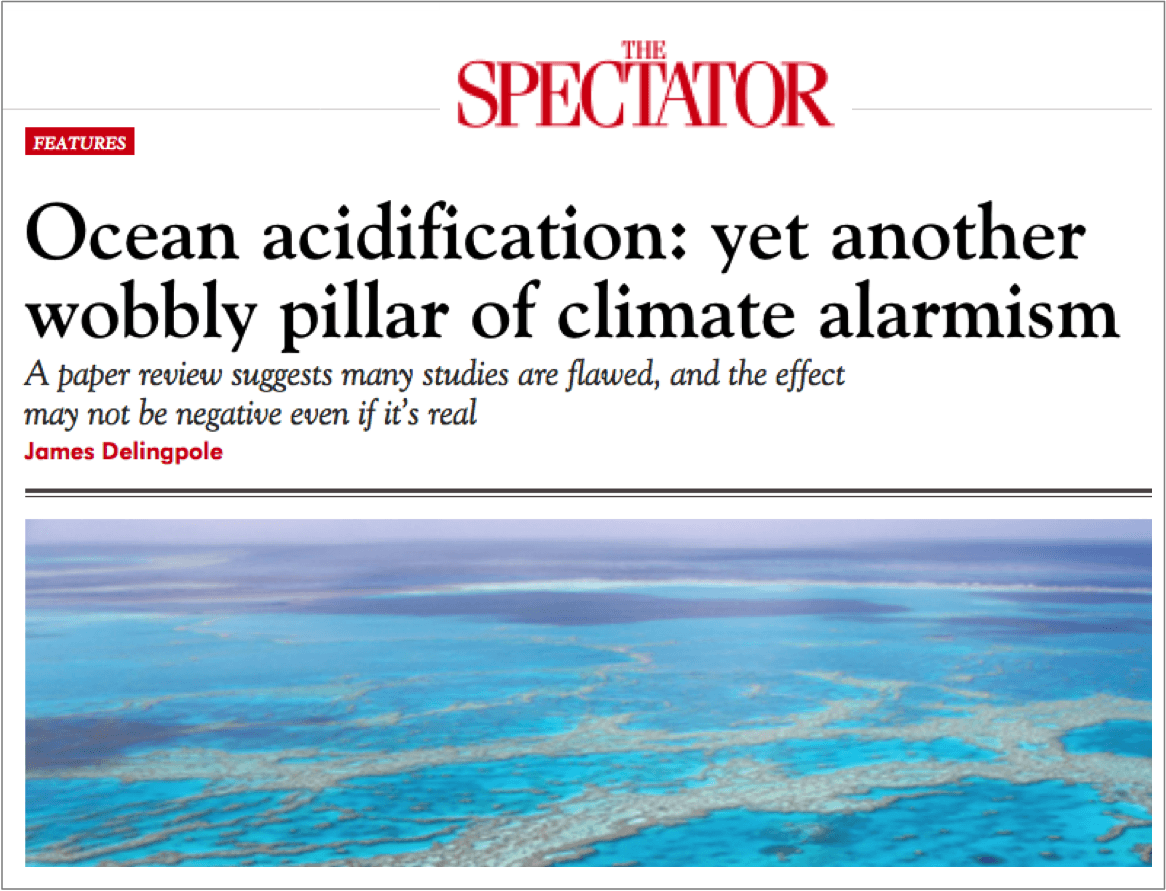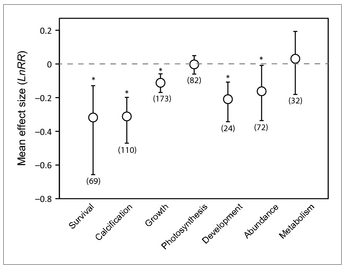

REVIEW
CLAIM: The impact on calcification, metabolism, growth, fertility and survival of calcifying marine species when pH is lowered up to 0.3 units […] is beneficial, not damaging. Marine life has nothing whatsoever to fear from ocean acidification.
Ken Caldeira, Senior Scientist, Carnegie Institution for Science:
There is much evidence available to falsify this statement. Many experiments have shown substantial negative biological responses at these levels of pH change[1]. Of course, some organisms are relatively unaffected by these levels.
I was involved in an experiment in Australia’s Great Barrier Reef where we added an ‘antacid’ to a plume of seawater, bringing seawater chemistry closer to what it was several hundred years ago. We let that water flow over a patch of reef and measured an increase in the growth rate of the reef. This showed that the increase in acidity caused by our CO2 emissions is already slowing reef growth, harming the reef.
- [1] Langdon (2002) Review of experimental evidence for effects of CO2 on calcification of reef builders. In Proc. 9th Int. Coral Reef Sym.
- [2] Albright et al (2016) Reversal of ocean acidification enhances net coral reef calcification. Nature
Richard Feely, Senior Scientist, NOAA's Pacific Marine Environmental Laboratory:
The Idso meta-analysis described by Delingpole was never published. It does not take into account the proper method of proportional scaling analysis. It does not demonstrate how negative effects will impact ecosystem services and food-web processes that can have an effect on economically important fish and shellfish. It does not address the impacts we are already seeing on important fish food, such as pteropods (see Bednarsek et al., 2012, 2014; Feely et al., 2016). There are several highly credible published meta-analysis studies (Kroeker et al. ,2013; Wittman & Pörtner, 2013; and Busch and McElhany, 2016) that have told a much different story than Idso’s unpublished work. Delingpole failed to even mention these other studies, which show very significant impacts on several marine taxa. In summary, Delingpole’s article demonstrates a complete lack of appreciation of scientific literature on this topic and the proper choice of scientific methods for data analysis and synthesis that leads to a more accurate understanding of the present-day and future impacts of ocean acidification.
- Bednaršek et al (2012) Extensive dissolution of live pteropods in the Southern Ocean, Nature Geoscience
- Busch & McElhany (2016) Estimates of the direct effect of seawater pH on the survival rate of species groups in the california current ecosystem. PloS One
- Bednaršek et al (2014) Limacina helicina shell dissolution as an indicator of declining habitat, Proc. of the Royal Society B
- Feely et al (2016) Chemical and biological impacts of ocean acidification along the west coast of North America, Estuarine, Coastal and Shelf Science
- Kroeker et al. (2013) Impacts of ocean acidification on marine organisms: quantifying sensitivities and interaction with warming. Global change biology
- Wittmann & Pörtner (2013) Sensitivities of extant animal taxa to ocean acidification. Nature Climate Change
Jean-Pierre Gattuso, Research Professor, CNRS, Université Pierre et Marie Curie and IDDRI:
The publication [used as a reference to back this claim] is not peer-reviewed, cherry-picks articles and does not involve proper statistical testing.
The comprehensive metanalysis that was performed by Kroeker et al. (2013) revealed decreased survival, calcification, growth, development and abundance in response to acidification when the broad range of marine organisms is pooled together. However, the magnitude of these responses varies among taxonomic groups.
Figure showing that “ocean acidification had a significant negative effect on survival, calcification, growth, development and abundance”. Caption: Mean effect of near future acidification on major response variables. Significance is determined when the 95% bootstrapped confidence interval does not cross zero. The number of experiments used to calculate the mean is included in parentheses. *denotes a significant effect. Source: Kroeker et al. (2013)
- Kroeker et al. (2013) Impacts of ocean acidification on marine organisms: quantifying sensitivities and interaction with warming. Global Change Biology.



